Digital Poster
Deep Learning Image Reconstruction I
ISMRM & ISMRT Annual Meeting & Exhibition • 03-08 June 2023 • Toronto, ON, Canada

| Computer # | |||
|---|---|---|---|
2919.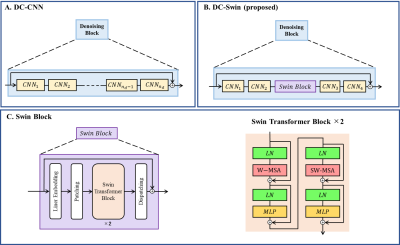 |
41 |
DC-Swin: Deep Cascade of Swin Transformer with Sensitivity Map
for Parallel MRI Reconstruction
Naoto Fujita1 and
Yasuhiko Terada1
1Graduate School of Science and Technology, University of Tsukuba, Tsukuba, Japan Keywords: Image Reconstruction, Machine Learning/Artificial Intelligence Deep learning (DL) reconstruction networks are predominantly architectures that unroll traditional iterative algorithms and tend to perform better than non-unrolled models. Both types of models use convolutional neural networks (CNNs) as building blocks, but CNNs have the disadvantage of focusing on local relationships in the image. To overcome this, hybrid models have been proposed that combine CNNs with Transformers that focus on long-range dependencies. However, these hybrid transformers have been limited to non-unrolled reconstruction networks. Here, we propose an unrolled reconstruction network using a hybrid Transformer, Deep Cascade of Swin Transformer (DC-Swin), and verify that DC-Swin has high performance. |
|
2920.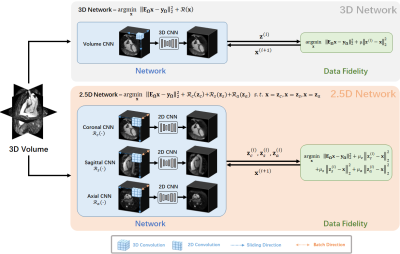 |
42 |
2.5D Networks for Physics-Guided Deep Learning Reconstruction of
3D Non-Cartesian MRI from Limited Training Data
Chi Zhang1,2,
Davide Piccini3,4,
Omer Burak Demirel1,2,
Gabriele Bonanno4,
Steen Moeller2,
Burhaneddin Yaman1,2,
Matthias Stuber3,5,
and Mehmet Akçakaya1,2
1Department of Electrical and Computer Engineering, University of Minnesota, Minneapolis, MN, United States, 2Center for Magnetic Resonance Research, University of Minnesota, Minneapolis, MN, United States, 3Department of Diagnostic and Interventional Radiology, Lausanne University Hospital and University of Lausanne, Lausanne, Switzerland, 4Advanced Clinical Imaging Technology, Siemens Healthineers International, Lausanne, Switzerland, 5Center for Biomedical Imaging, Lausanne, Switzerland Keywords: Image Reconstruction, Machine Learning/Artificial Intelligence Although recent studies enabled physics-guided deep learning (PG-DL) reconstruction of 3D non-Cartesian MRI, it suffers from blurring, partially due to limited training data. In this study we propose 2.5D PG-DL using three 2D CNNs on orthogonal views for 3D reconstruction to efficiently exploit the limited training data. Results on 3D kooshball coronary MRI show the proposed strategy noticeably improves image sharpness. |
|
2921.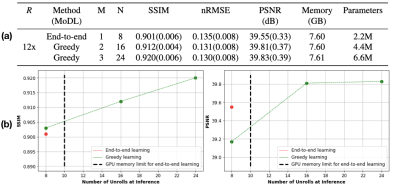 |
43 |
Greedy Learning for Memory-Efficient Self-Supervised MRI
Reconstruction
Arushi Gupta1,
Batu M Ozturkler2,
Arda Sahiner2,
Tolga Ergen2,
Arjun D Desai2,3,
Shreyas Vasanawala3,
John M Pauly2,
Morteza Mardani2,
and Mert Pilanci2
1California Institute of Technology, Pasadena, CA, United States, 2Electrical Engineering, Stanford University, Stanford, CA, United States, 3Radiology, Stanford University, Stanford, CA, United States Keywords: Image Reconstruction, Image Reconstruction Deep learning (DL) has recently shown state-of-the-art performance for accelerated MRI reconstruction. However, supervised learning requires fully-sampled training data, and training these networks with end-to-end backpropagation requires significant memory for high-dimensional imaging. These challenges limit the use of DL in high-dimensional settings where access to fully-sampled data is unavailable. Here, we propose self-supervised greedy learning for memory-efficient MRI reconstruction without fully-sampled data. The method divides the end-to-end network into smaller network modules and independently calculates a self-supervised loss for each subnetwork. The proposed method generalizes as well as end-to-end learning without fully-sampled data with at least 7x less memory usage. |
|
2922.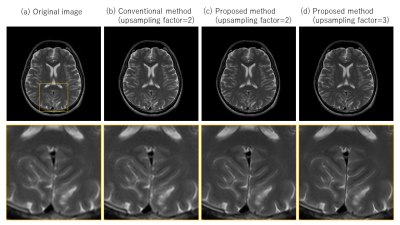 |
44 |
High Resolution MR Reconstruction with Functionally Separate
Neural Networks
Hideaki Kutsuna1,
Shun Uematsu2,
and Kensuke Shinoda2
1MRI Systems Development Department, Canon Medical Systems Corporation, Kanagawa, Japan, 2MRI Systems Development Department, Canon Medical Systems Corporation, Tochigi, Japan Keywords: Image Reconstruction, Machine Learning/Artificial Intelligence, Super resolution The authors propose a new reconstruction method to obtain higher resolution images from an MR acquisition. The method incorporates MR physics and two neural networks, which are functionally separate, for denoising and upsampling. The proposed method was evaluated by applying it to both retrospectively and prospectively undersampled data. The result showed that the proposed technique is capable of reconstructing higher resolution images over a conventional method, by multiplying the matrix size while keeping more detail structure in the originally sampled data. |
|
2923.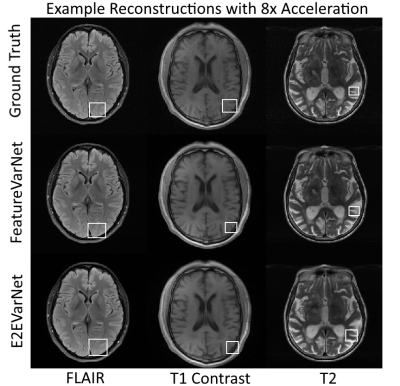 |
45 |
Improving variational network based 2D MRI reconstruction via
feature-space data consistency
Ilias Giannakopoulos1,
Patricia Johnson1,
Riccardo Lattanzi1,
and Matthew Muckley2
1The Bernard and Irene Schwartz Center for Biomedical Imaging (CBI), Department of Radiology, New York University Grossman School of Medicine, New York, NY, United States, 2Facebook AI Research, Meta, New York, NY, United States Keywords: Image Reconstruction, Parallel Imaging, Compressed Sensing, Deep Learning Deep learning (DL) methods have enabled state-of-the-art reconstructions of magnetic resonance images of highly undersampled acquisitions. The end-to-end variational network (E2E VarNet) is a DL method that can output high quality reconstructions through an unrolled gradient descent algorithm. Nevertheless, the network discards a lot of high-level feature representations of the image to perform data consistency in the image space. Here, we adapted the E2E VarNet architecture to perform the data consistency in a feature space. We trained the proposed network using the fastMRI brain dataset and observed 0.0013 SSIM improvement for eight-fold accelerations.
|
|
2924.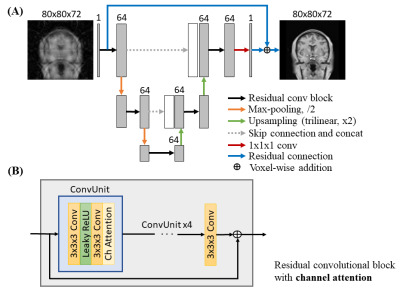 |
46 |
Accelerate Single-Channel 3D MRI through Undersampling and Deep
Neural Network Reconstruction
Christopher Man1,2,
Vick Lau1,2,
Jiahao Hu1,2,
Junhao Zhang1,2,
Linfang Xiao1,2,
and Ed X. Wu1,2
1Laboratory of Biomedical Imaging and Signal Processing, The University of Hong Kong, Hong Kong SAR, China, 2Department of Electrical and Electronic Engineering, The University of Hong Kong, Hong Kong SAR, China Keywords: Image Reconstruction, Image Reconstruction 3D MRI data contains more redundant information than 2D MRI data, which is favourable for reconstruction. However, deep learning reconstruction of 3D MRI data remains to be explored due to the computational burden that scales exponentially with spatial dimensions. This study presents a deep learning method to reconstruct single-channel 3D MRI data with uniform undersampling along two phase-encoding directions, in which conventional multi-channel parallel imaging methods are generally not applicable. The results demonstrate the robust reconstruction for single-channel 3D MRI data at high acceleration and in the presence of anomaly. |
|
2925. |
47 |
Deep Unfolding MR reconstruction - weighting the k-space
sampling Density in training Loss (wkDeLo)
Parna Eshraghi Boroojeni1,
Wejie Gan2,
Jiaming Liu2,
Yuyang Hu2,
Yasheng Chen3,
Paul Commean4,
Cihat Eldeniz5,
Tongyao Wang6,
Gary Skolnick7,
Corinne Merrill7,
Kamlesh Patel7,
Hongyu An6,
and Ulugbek Kamilov8
1Washington University in Saint Louis, Saint Louis, MO, United States, 2Engineering - Computer Science and Engineering, Washington University in Saint Louis, Saint Louis, MO, United States, 3Neurology, Washington University in Saint Louis, Saint Louis, MO, United States, 4Radiology - Main - Research - Radiological Sciences, Washington University in Saint Louis, Saint Louis, MO, United States, 5Radiology - Research Imaging Facilities - MR Facility, Washington University in Saint Louis, Saint Louis, MO, United States, 6Radiology - Main - Research - Radiological Sciences - Biomedica, Washington University in Saint Louis, Saint Louis, MO, United States, 7Surgery - Plastics, Washington University in Saint Louis, Saint Louis, MO, United States, 8Engineering - Electrical & Systems Engineering, Washington University in Saint Louis, Saint Louis, MO, United States Keywords: Image Reconstruction, Image Reconstruction We develop a self-supervised and physics-guided deep unfolding (DU) network for MR image reconstruction by weighting the k-space sampling Density in network training Loss (wDeLo). We have demonstrated that high-quality MR images at a spatial resolution of 0.6x0.6x0.8 mm3 could be achieved using an acquisition time of 1 minute (x6.25 acceleration) or 45 seconds (8x acceleration). Compared to SSDU and its uniform weighted counterpart (un-wDeLo), the wDeLo method significantly improves PSNR and SSIM. It had fewer artifacts, lower noise, and preserved image sharpness. |
|
2926.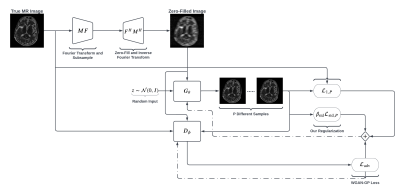 |
48 |
A Regularized Conditional GAN for Posterior Sampling in MR Image
Reconstruction
Matthew Charles Bendel1,
Rizwan Ahmad2,
and Philip Schniter1
1Dept. ECE, The Ohio State University, Columbus, OH, United States, 2Dept. BME, The Ohio State University, Columbus, OH, United States Keywords: Image Reconstruction, Machine Learning/Artificial Intelligence For magnetic resonance (MR) image reconstruction, Fourier-domain measurements are collected at rates far below Nyquist to reduce clinical exam time. Because many plausible reconstructions exist that are consistent with a given measurement, we use machine learning to sample from the posterior distribution rather than generate a single image reconstruction. Many such works leverage score-based generative models (SGMs), which seek to iteratively denoise a random input but require many minutes to generate each sample. We propose a conditional generative adversarial network (GAN) that generates hundreds of posterior samples per minute and outperforms the current state-of-the-art SGM for multi-coil MR posterior sampling. |
|
| 2927. | 49 |
Acquisition Adaptive Unrolled Deep Learning Framework for
Parallel MRI
Aniket Pramanik1,
Sampada Bhave2,
Saurav Sajib2,
Samir Sharma2,
and Mathews Jacob1
1University of Iowa, Iowa City, IA, United States, 2Canon Medical Research USA, Mayfield Villlage, OH, United States Keywords: Image Reconstruction, Machine Learning/Artificial Intelligence Model-based Deep Unrolled Networks offer high quality reconstructions but the performance degrades if any mismatch occurs in acquisition settings. Different networks for different acquisition settings require extensive training data, in addition to making the clinical deployment difficult. We propose a single unrolled deep-learning algorithm called as Ada-MoDL, whose parameters are conditioned on the acquisition information (metadata) of a dataset, using a Multi-Layer Perceptron (MLP) that maps the metadata to network parameters. Ada-MoDL outperforms models trained for a specific acquisition setting or a single model trained with all the available contrasts, when the training data in each acquisition setting is limited. |
|
2928.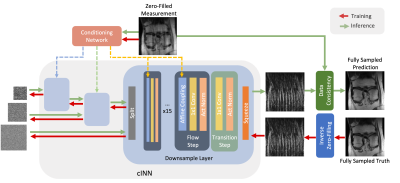 |
50 |
Posterior Sampling for Accelerated Multicoil MRI Reconstruction
using a Conditional Normalizing Flow
Jeffrey Wen1,
Rizwan Ahmad2,
and Philip Schniter1
1Electrical Engineering, The Ohio State University, Columbus, OH, United States, 2Biomedical Engineering, The Ohio State University, Columbus, OH, United States Keywords: Image Reconstruction, Machine Learning/Artificial Intelligence For accelerated MR image reconstruction, machine learning (ML)-based methods outperform traditional sparsity-based methods by exploiting large datasets to learn effective priors. However, most ML methods output only a single image reconstruction when in fact there may be many plausible reconstructions given the measurement and prior. To extract this diagnostically relevant information, we propose to explore the space of plausible images, i.e., to sample the posterior, using ML. Among ML methods, conditional normalizing flows (CNFs) stand out for rapid sample generation and simple likelihood-based training. In this work, we present the first CNF for posterior sample generation in accelerated multicoil MRI. |
|
2929.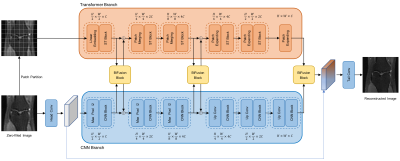 |
51 |
MixRecon: A neural network mixing CNN and Transformer utilizes
hybrid representations of image features for Accelerated MRI
Reconstruction
Hongjian Kang1,
Liping Zhang1,
and Weitian Chen1
1Department of Imaging and Interventional Radiology, The Chinese University of Hong Kong, Hong Kong, Hong Kong Keywords: Image Reconstruction, Machine Learning/Artificial Intelligence Accelerated reconstruction for magnetic resonance imaging (MRI) is a challenging ill-posed problem because of the excessive under-sampling operation in k-space. Existing CNN-based and Transformer-based solutions face difficulties obtaining powerful representation due to relatively unitary local or global feature modeling capability. In this study, we develop a dual-branch network that can simultaneously exploit the complementarity of the two-style features by leveraging the merits of CNN and Transformer, to generate high-quality reconstruction from zero-filled images in the spatial domain. Qualitative and quantitative results from the fastMRI dataset demonstrate that the proposed method can achieve improved performance compared with other benchmark methods. |
|
2930.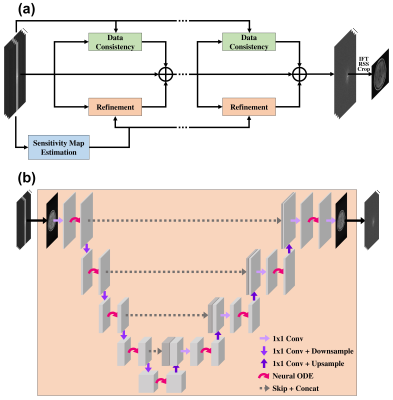 |
52 |
Model-based neural ODE network for parallel MRI reconstruction
Jun-Hyeok Lee1,
Gawon Lee1,
and Se-Hong Oh1
1Department of Biomedical Engineering, Hankuk University of Foreign Studies, Yongin, Korea, Republic of Keywords: Image Reconstruction, Parallel Imaging, Neural ODE In parallel MRI, DNN-based models have recently outperformed conventional reconstruction techniques and can reconstruct high-quality MRI images, especially at high acceleration factors. We propose a model-based neural ODE network to reconstruct artifact-free MR images from under-sampled k-space data. We replaced the existing U-Net with a modified U-Net framework using neural ODEs with E2E-VarNet as the backbone. Our network solves unrolled iterations of reconstruction optimization with neural ODEs, and each neural ODE uses a gradient update step as a dynamics step. Our approach showed the improved reconstruction performance comparable to the SOTA method with few parameters. |
|
2931.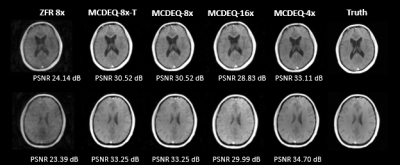 |
53 |
Multicoil Deep Equilibrium MRI Reconstruction
Muntasir Shamim1,
Chenwei Tang2,
Leonardo Rivera2,
and Kevin M Johnson2
1Electrical and Computer Engineering, University of Wisconsin Madison, Madison, WI, United States, 2Medical Physics, University of Wisconsin Madison, Madison, WI, United States Keywords: Image Reconstruction, Brain Deep equilibrium (DEQ) image reconstruction models have demonstrated improved performance while remaining memory efficient for single coil MRI reconstructions; however, DEQ models are known to be susceptible to model drift due to variabilities in the forward model. In the case of multicoil MRI, the forward model is changed due to the sampling patterns and coil sensitivity encoding. In this work, we implemented a multicoil DEQ model and analyzed model drift with respect to the coil sensitivities. |
|
2932.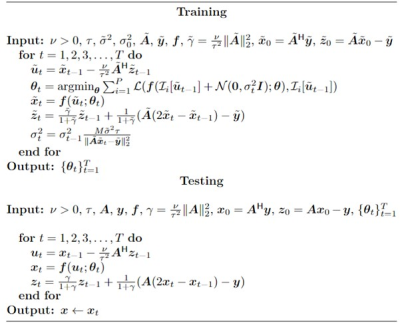 |
54 |
Recovery with self-calibrated denoisers from multiple
undersampled images (ReSiDe-M)
Sizhuo Liu1,
Philip Schniter1,
and Rizwan Ahmad1
1The Ohio State University, Columbus, OH, United States Keywords: Image Reconstruction, Machine Learning/Artificial Intelligence Recovery with a self-calibrated denoiser (ReSiDe) is an unsupervised learning method based on the plug-and-play (PnP) framework. In ReSiDe, denoiser training and a call to the denoising subroutine are performed in each iteration of PnP. However, ReSiDe is computationally slow, and its performance is sensitive to the noise level selected to train the denoiser. Here, we extend ReSiDe from single-image to multi-image recovery (ReSiDe-M), improving both performance and computation speed. We also propose an auto-tuning method to select the noise level for denoiser training. Using data from fastMRI and MRXCAT perfusion phantom, we compare ReSiDe-M with other unsupervised methods. |
|
2933.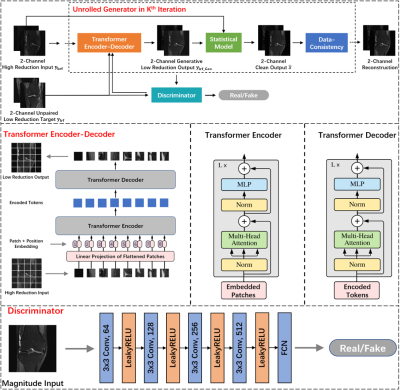 |
55 |
Accelerating MRI Using Vision Transformer with Unpaired
Unsupervised Training
Peizhou Huang1,
Hongyu Li2,
Ruiying Liu2,
Xiaoliang Zhang1,
Xiaojuan Li3,
Dong Liang4,
and Leslie Ying1,2
1Biomedical Engineering, State University of New York at Buffalo, Buffalo, NY, United States, 2Electrical Engineering, State University of New York at Buffalo, Buffalo, NY, United States, 3Program of Advanced Musculoskeletal Imaging (PAMI), Cleveland Clinic, Cleveland, OH, United States, 4Paul C. Lauterbur Research Center for Biomedical Imaging, SIAT CAS, Shenzhen, China Keywords: Image Reconstruction, Machine Learning/Artificial Intelligence, Unpaired unsupervised training, Transformer In this abstract, we propose a novel deep-learning reconstruction method that enables training with only unpaired undersampled k-space data without the ground truth. The network utilizes a statistical model for the undersampling artifacts to enable unsupervised learning, and the generative adversarial network to enable unpaired training. In addition, the physics model is incorporated into the transformer network by unrolling the underlying optimization problem. Experiment results based on the fastMRI knee dataset exhibit marked improvements over the existing state-of-the-art reconstructions. |
|
2934.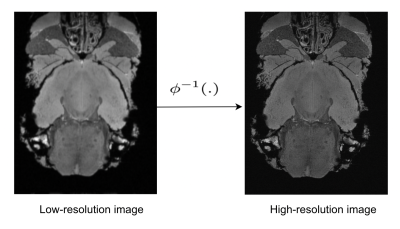 |
56 |
On Training Model Bias of Deep Learning based Super-resolution
Frameworks for Magnetic Resonance Imaging
Mamata Shrestha1,
Nian Wang2,3,
and Ukash Nakarmi1
1Computer Science and Computer Engineering, University of Arkansas, Fayetteville, AR, United States, 2Radiology and Imaging Sciences, Indiana University School of Medicine, Indianapolis, IN, United States, 3Stark Neurosciences Research Institute, Indianapolis, IN, United States Keywords: Image Reconstruction, Data Processing, Image super-resolution, model bias, deep learning Deep Learning based image super-resolution methods are biased towards training data modeling. Generalizability of DL based super-resolution frameworks can be improved by introducing variability and diversity in the training data. |
|
2935.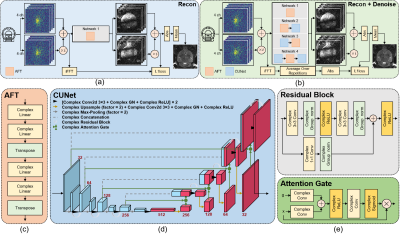 |
57 |
Deep Learning-based MRI Reconstruction with Artificial Fourier
Transform(AFT)-Net
Yanting Yang1,
Andrew F. Laine1,
and Jia Guo2,3
1Department of Biomedical Engineering, Columbia University, New York, NY, United States, 2Department of Psychiatry, Columbia University, New York, NY, United States, 3Mortimer B. Zuckerman Mind Brain Behavior Institute, Columbia University, New York, NY, United States Keywords: Image Reconstruction, Machine Learning/Artificial Intelligence Conventional medical image reconstruction methods are less parametric and lack generality due to random error and noise. A novel artificial Fourier transform (AFT) framework is developed which determines the mapping between k-space and i-space like DFT while can be fine-tuned with further training. The flexibility of AFT allows it to be simply incorporated into any existing deep learning network as learnable or static blocks. Reconstruction and denoising tasks are combined into a unified network that simultaneously enhances the image quality. AFT-Net achieves competitive results compared with other methods and proofs to be more robust to additional noise and contrast differences. |
|
2936.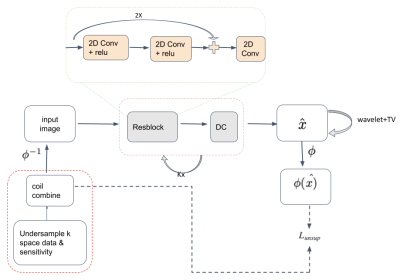 |
58 |
When System Model meets Image Prior: An Unsupervised Deep
Learning Architecture for Accelerated Magnetic Resonance Imaging
Ibsa Kumara Jalata1 and
Ukash Nakarmi1
1Computer Science and Computer Engineering, University of Arkansas, Fayetteville, AR, United States Keywords: Image Reconstruction, Data Processing Unsupervised deep learning framework that integrates system priors using unrolled optimization and general image priors can reconstruct high quality Magnetic Resonance images comparable to supervised methods from highly undersampled k-space data. We develop an unsupervised deep learning framework that integrates system priors in MR acquisition and image priors to reconstruct high quality MR images from highly undersampled k-space data without using ground truth images. |
|
2937.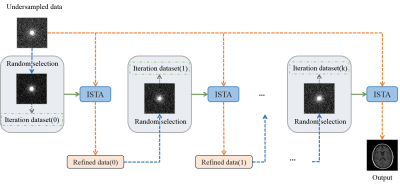 |
59 |
Self-Supervised MR Image Reconstruction with Stage-by-Stage Data
Refinement
Xue Liu1,
Cheng Li1,
Yu Zhang1,
Haoran Li1,
Yeqi Wang1,
Hairong Zheng1,
and Shanshan Wang1,2,3
1Paul C. Lauterbur Research Center for Biomedical Imaging, Shenzhen Institutes of Advanced Technology, Chinese Academy of Sciences, Shenzhen, China, 2Peng Cheng Laboratory, Shenzhen, China, 3Guangdong Provincial Key Laboratory of Artificial Intelligence in Medical Image Analysis and Application, Guangdong Provincial People’s Hospital, Guangdong Academy of Medical Sciences, Guangzhou, China Keywords: Image Reconstruction, Machine Learning/Artificial Intelligence Deep learning-based, especially fully supervised learning-based, methods have shown unprecedented performance in MR image reconstruction. Fully sampled data are utilized as references to supervise the learning process. However, it is challenging to acquire fully sampled data in many real-world application scenarios. Unsupervised approaches are required. Here, we propose an iterative data refinement method for enhanced self-supervised MR image reconstruction. Different from Yaman's self-supervised learning method (SSDU), training data in our method are refined iteratively during model optimization to progressively eliminate the data bias between the undersampled reference data and fully sampled data. Better reconstruction results are obtained. |
|
2938.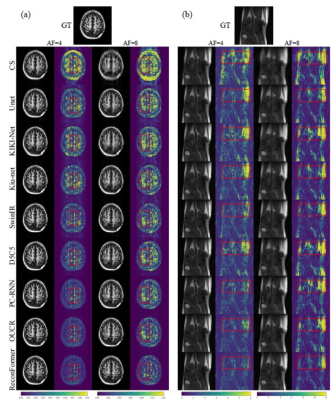 |
60 |
Accelerated MRI Reconstruction Using a Lightweight Recurrent
Transformer: ReconFormer
Pengfei Guo1,
Yiqun Mei1,
Jinyuan Zhou2,
Shanshan Jiang2,
and Vishal M. Patel1
1Department of Computer Science, Johns Hopkins University, Baltimore, MD, United States, 2Department of Radiology, Johns Hopkins University, Baltimore, MD, United States Keywords: Image Reconstruction, Image Reconstruction Accelerating MRI reconstruction process is a challenging ill-posed inverse problem due to the excessive under-sampling operation in k-space. While state-of-the-art algorithms have shown a great progress based on convolutional neural networks (CNN), transformers for MRI reconstruction has not been fully explored in the literature. We propose a recurrent transformer model, namely, ReconFormer, for MRI reconstruction which can iteratively reconstruct high fertility magnetic resonance images from highly under-sampled k-space data. We validate the effectiveness of ReconFormer on multiple datasets with different magnetic resonance sequences and show that it achieves significant improvements over the state-of-the-art methods with better parameter efficiency. |
|
The International Society for Magnetic Resonance in Medicine is accredited by the Accreditation Council for Continuing Medical Education to provide continuing medical education for physicians.